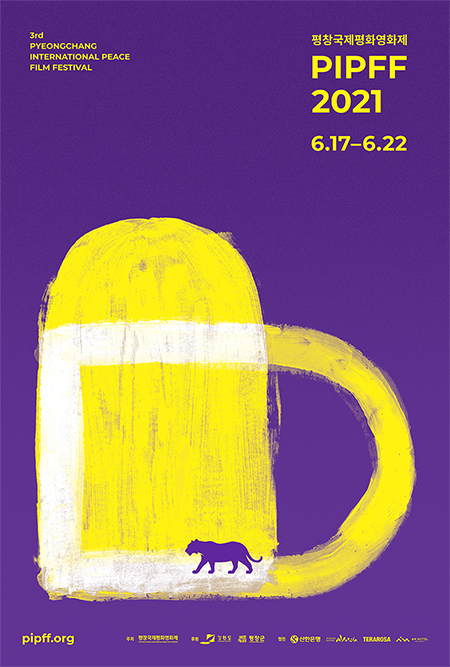

- Opening Ceremony of PyeongChang International Peace Film Festival (PIFF)
From the 17th to the 22nd of June, the PyeongChang International Peace Film Festival (PIPFF) held their 3rd annual festival. The PIPFF continues the 2018 PyeongChang Olympics’ mission of promoting international peace through films. Topics regarding unification, coexistence, understanding the value of peace, geopolitical issues, etc, were covered. This year, 78 films from 26 countries were presented. Unfortunately, many directors were not able to attend the festival in person due to the pandemic. But, another successful event was able to take place due to everyone’s cooperation and mindfulness to the safety measures. On the final day of the festival, LA Time Asia Journal’s K-UNIV reporter had the chance to interview 3 of the directors.

Director Haesup Shin of ‘Comrade Anna’
Haesup Shin, a Swiss-Korean director born and raised in Switzerland, was the first to be interviewed. This year, Shin brought his film. “Comrade Anna,” to the PIPFF. The heartwarming film is set in Switzerland and follows the encounter of a South Korean-Swiss child named Anna and a North Korean man. The two share a wholesome connection as the movie unfolds into a fairy tale-like story. The film touches on social issues that are relevant today such as the racial prejudice against asians.
“I wondered what it would be like to look at North Korea with the pure eyes of a child who has yet to have political opinion and knowledge.”
Shin pitched the movie with the intention of showing a pure perspective on North Korea and North Koreans. In modern media, there are countless depictions of North Korea and their people. However, many of these depictions are portrayed with prejudice. Shin wanted to humanize the image by telling the story through the perspective of a child.

Director Suh-Young Park of ‘Soonyoung’
Suh-Young Park was the director of the film, Soonyoung. Soonyoung is a film that follows a woman in her late 30s who spent the past 2 decades taking care of her sick parents. After her parent’s passing, the rest of her family turns their back on her and she is forced to overcome countless obstacles. Throughout the story, she meets new people and finds solutions to her hardships. The viewers are able to spectate her late emergence to the real world.
When asked what inspired her to create such a melancholic film, Park stated,”It’s a little embarrassing to say this, but my inspiration starts with the people around me. I write scenarios based on what is happening in the real world… The story Soonyoung started off as my aunt’s story. I wanted to show a story of a brave woman.”
Park likes to capture the emotion and atmosphere of a scene through the facial expressions of the characters in the scene. Her attention to detail in this aspect allows her style as a director to stand out

Director Ju-Seung Lee of ‘Mast’
The third director that was interviewed was Ju-Seung Lee. Not only was he the director for his movie, “Mast,” but he also played the lead role. The Korean title, “Dottae,” translates and refers to the last cigarette in the box. The plot follows a young man who fails to find success in his career. With no hope left, he plans to suicide after smoking the last “dottae.” On his way to proceed with his plan, he meets an old acquaintance who tags along and the movie unfolds into a black comedy.
When asked about the meaning behind this title, Lee replied, “While at first glance, the title alludes to a depressing theme of something coming to an end, the purpose of the title is the opposite. However, I wanted to give new perspectives of ending and closure. I wanted to show that the end of one thing leads to the start of another.”
This film was based on the director’s own personal experience. He wanted to educate people in mental wellness. “I thought a lot about depression last year. I think people who suffer from depression see things that normal people can’t see. I wanted the audience to be able to empathize with this feeling and to give hope to those who are depressed.”
The PIPFF was a fantastic platform for talented artists around the world to spread the message of peace and love.






